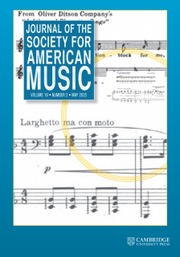Article contents
“Unstuck in time”: Harry Partch's Bilocated Life
Published online by Cambridge University Press: 11 May 2015
Abstract
In a letter dated to 1960, Harry Partch describes living two lives simultaneously—one in modern America and another in ancient Greece. Furthermore, throughout his life, Partch exhibited striking dualities in both his music and personal life. Partch's affinity for Greek themes and modalities in his music and music theory is well known, but less known is his feeling of bilocation between Greek and modern life. Using writings by Vonnegut, Woolf, and Stephen Hawking, I examine methods of constructing history that support Partch's temporal irregularity and, in so doing, foster new ways of understanding Partch and his music. With a particular focus on corporeality within his late work Revelation in the Courthouse Park, I explore how Partch leaned on his sense of bilocation to cope with his decidedly outsider status, how that in turn helped him deal with reality, and how biographers might tackle this most perplexing issue.
- Type
- Research Article
- Information
- Copyright
- Copyright © The Society for American Music 2015
References
References
- 2
- Cited by


